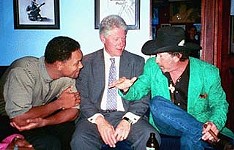Celebrated for the Least of Reasons
Larry L. King's Letters
By Tom Doyal, Fri., Oct. 15, 1999

Larry L. King: A Writer's Life in Letters, Or, Reflections in a Bloodshot Eye
edited by Richard A. HollandTCU Press, $27.95 hard
Larry L. King has a new book and I have read it and took to writin' just like him, 'cept for the money: Larry L. King is an original and authentic voice of American letters. Happily, he is also a Texan. Most of us know him through his virile, wickedly funny, and astute social satire The Best Little Whorehouse in Texas. And, while Whorehouse is a wonderful achievement, it is the least of reasons to celebrate the illustrious career of Lawrence Leo King, the poor depression-era West Texas farm boy who wrote his way to notoriety, some cash, and tons of critical savagery.
King's plight is similar to that of the great English actor Alec Guinness, who trod the boards of the English stage and stood before the cameras of the world for almost 70 years and now lives in popular memory as Obi Wan Kenobi of Star Wars fame (much to his consternation), thus reducing a lifetime of brilliant work to a trivia question answer. I don't think King resents his connection with Whorehouse, about which he once quipped, "It made me about two-thirds rich." Not a line commonly heard from American writers these days, with a few notable exceptions. After all, Whorehouse continues to be a smash success even today (its first production as a play was in 1978) and is bitingly clever and funny, funny, funny. His musical theatre confection presents us with Miss Mona and Sheriff Ed, the best couple since Marshall Dillon and Miss Kitty to illuminate the hypocrisies of village life and display the redemptive qualities of even sullied love given and taken with gusto.
But King's life and career are so much larger than the Whorehouse connection reveals, and this newly published collection of letters can reveal the full glorious arc of his journey and present him to us anew, in other connections, careers, and attainments. King has been a small- town newspaperman, a political aide to a powerful congressman, a flamboyantly successful magazine journalist, a novelist, playwright, wit and raconteur, each of which he assayed splendidly. King's career is a fine lens through which to view the cultural ferment of our times.
Along the way, whisky was drunk, dope was smoked, and other pleasures indulged, a past King wryly acknowledges in his subtitle: Reflections in a Bloodshot Eye.
King's letters are collected in the Special Collections of the Southwestern Writers Collection on the Southwest Texas State University campus in San Marcos, a splendid collection worthy of its own story. And, when I say "letters," I must explain that we ain't talking about a shoebox full of postcards and a couple of badly written love letters. That would be my collected letters. King writes letters daily, as most of us breathe, and has done this throughout his life, commencing in childhood. There was an astounding wealth of material to choose from.
King wrote to publishers, editors, agents, critics both professional and amateur, friends and family, and his cronies in the writing game, including William Styron, Willie Morris, Bud Shrake, David Halberstam, Billy Lee Brammer, and others. Among the most revealing letters are those to his cousin and childhood friend Lanville Gilbert and his spouse Glenda.

The impact of a letter delivered by a rural mail carrier to an isolated farmhouse can't be exaggerated and King recalls those feelings clearly. He respected letters and the written word early, citing from various letters received at the old home place when he was a child. One old uncle wrote King's father a letter from the pen down in Huntsville, which King recites in its entirety: "Dear Clyde, I do wisht you'd try to get me out as I am not-a-tall satisfied down here."
The selection of letters for this book was done by King and by the editor of this volume, the very capable Dick Holland, former curator of the collection (and Chronicle contributor). Holland's contribution to the book is noteworthy for his ability to place the gemstone in a setting that makes every facet blaze and pulse with life. There is no doubt that King's life and work are the centerpiece, but he has been well served by the thoughtful and quietly competent work of Holland.
King remembers, with an uncanny immediacy at this remove in time, his lonely childhood on the dusty and impoverished farms of West Texas. Those with aspirations in his family became oil field roughnecks, ranch hands, or short-order cooks (a touching measure of the ladders available to them). His people worked hard for little, a familiar Texas theme enlivened by the legendary King humor. In the entire book, King comes closest to poignant revelation in his recollections of family, both his family of origin and the families he created in adult life.
King began to realize his childhood ambitions to become "A Famous Arthur" by becoming a newspaper journalist in the towns of West Texas and nearby, and the first significant rung on his ladder of upward mobility was a stint as a cub reporter on the Daily Flare of Hobbs, New Mexico, "the second paper in a town of 10,000 people." He was fired after only five months for taking a federal judge to task on page one. Ah, the awkward and inconvenient marriage of journalism and politics! He landed on his feet as a sportswriter for the Midland Reporter-Telegram.
A subsequent stint at the paper in Odessa led to his being chosen as the congressional aide to the newly elected congressman, J.T. Rutherford. King was on his way to Washington, D.C., and vistas beyond West Texas. Later, King was the administrative assistant to Fort Worth congressman Jim Wright, a post he held when President John F. Kennedy was assassinated. King's observations of political life in Washington are as trenchant, funny, and savage as any of his other writing.
In fact, King's letters may be funnier than much of his other writing. I know that is hard to imagine, if you know his work, but in his letters to friends and family, he can fairly peel hide when his ire is raised. And pity the poor editor or publisher who failed King (and they are many). Each was likely to receive an unforgettable letter from King, who often managed to be vitriolic and funny in one swell foop. Often the letters appeal for money or are an unvarnished upbraiding for the lack of effort in the promotion or sale of a King book.
This is what he wrote to Bob Gutwillig, his editor at New American Library on December 27, 1966:
"Dear Sweetie Pie:

Now that the tinsel glitter of Christmas is gone with all of its vulgarities (John Wayne as a Roman Soldier crying in the shadow of the The Cross, Broderick Crawford as Santa Claus, Truman Capote as the Yuletide Fairy) let me wish you a heart-felt Bah Humbug and the same throughout the coming New Year." The letter goes on to plead for prompt payment of an advance for a new book.
During his political years, King was trying to write novels, and he published The One-Eyed Man in 1966. The book's dismal reception disappointed King; his agent, editor, and publisher were all called to account for their failings. These are some of the funniest letters in the book. I am sure the unfolding events were not amusing to King at the time, but his letters about his sufferings are just fall-down funny. To a rejecting editor, King wrote: "Dear Giver-of-Angst: Well, your kind letter of rejection closed me up like a winter tulip."
While the Early Struggles are good material -- amusing, raucous, and earthy -- the part of King's writing life which has been most sadly obscured by the passage of time are his years as a magazine journalist and essayist at Harper's magazine, then under the editorial guidance of the late Willie Morris, another son of the South with extensive Texas connections. It is difficult to describe the state of magazine journalism before the flowering of Harper's. It was mostly gentle, nostalgic Americanism of The Saturday Evening Post variety, editorially as sleepy, happy, and golden as a Norman Rockwell cover. Drugs, rock, Vietnam, and treachery in high office created a climate in which young writers like King, David Halberstam, Marshall Frady, Morris, and others could bay like hounds along the creek on a cold, clear winter night. Suddenly, everything was different, and King was a pacesetter in the game, a national figure.
When those magical times began to fade, King created The Best Little Whorehouse in Texas, as a magazine article, a play, a musical, and a film. His travails in the world of musicals and film are riotous. His feud with "the alleged American actor, Bert (sic) Reynolds" are a complete hoot, a battle of wits in which one contestant is unarmed and it ain't King.
King still makes his home in Washington, D.C. Lest you think he has become any less astute a political observer, go see his play The Dead Presidents' Club, in which the recently deceased Richard Nixon discusses the new book he was working on at the time of his death, Reassessing Integrity. King continues to write, mostly as a playwright these days.
King's letters are a treasure because they present his triumphs to us once again, as seen through his eyes. The parties at Norman Mailer's house, the druggy evenings with William Styron, the whole boozy scene revealed for our delectation. And always the ready wit and the turbo-charged "country" humor are present, even, or maybe especially, in the hard times. There were hard times, too, divorce and other failed loves, money trouble, family responsibilities, the fierce ambitions not fully realized, the frenetic pace of work, and the need for money.
The funny man often casts a shadow darker than the average, and this is true of King, who can be a difficult and demanding man, even as a friend or a collaborator. It is his way, but, to his enormous credit, there is nothing sneaky about any of it. King is as stumpy, gnarled, and hard as a mesquite fence post and possessed of the same degree of integrity.
In case I have not been clear, I want you to read this book. It is a brave book and a tremendous slice of American culture spanning the last 50 years. The book is entertaining, illuminating, touching, and did I mention funny? Best of all, it presents Larry L. King in his full splendor, ready to receive his richly deserved full accolades, not for a single good piece, but for the dazzling and full writer's life of attainments he has lived. ![]()
In the interests of full candor between us, Patient Reader, I am moved to tell you that in my other life as a juristitute, I vetted this book prior to its publication. I feel so much better now that I have told you.
Larry L. King will emcee the Texas Book Festival First Edition Literary Gala on Friday, November 5. On Saturday, November 6, at 11:30am, in the Senate Chamber of the Texas Capitol, King, with A.C. Greene and Molly Ivins, will participate in a panel discussion titled "Unholy Trinity."








